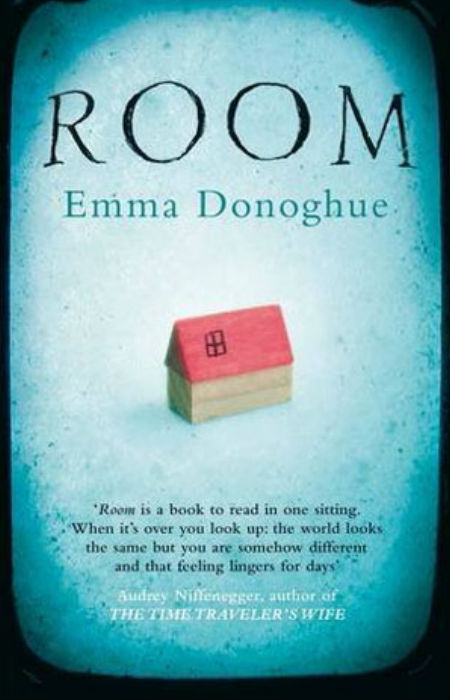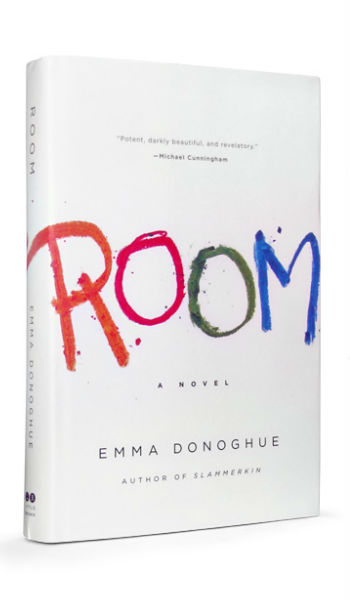
Room by Emma Donoghue is one of those rare, beautifully-crafted books that draws you into its world completely and absolutely and affects you profoundly in ways you couldn’t have imagined when you first pick it up.
It’s hard, nay all but impossible not to be affected by the story of Jack, a boy who has just turned five and whose entire world consists of a small hermetically-sealed, soundproofed backyard shed that he shares with his young mid-20s mother, who is only ever referred to as “Ma”.
Within this tightly-constricted universe, where everything from food to entertainment and clothing is rationed by the sexually-predatious man simply called “Old Nick” who snatched Ma off the streets 7 years earlier, and who visits most nights after 9pm for wholly un-consensual sex.
It’s a bleak world for Ma whose only joy is her educationally-advanced son who was long ago told by his mother that Room is the beginning and end of all things and that Outside – everything from the furniture to the food and clothing is assigned a capitalised personification by jack who treats them as if they are fellow citizens of Planet Room – including everything he sees on the grainy failing TV is make believe.
“‘Now you’re safe, it’s gathering up all those scary thoughts you don’t need anymore, and throwing them out as bad dreams.’ His hands do the throwing.
I don’t say because of manners, but he’s actually got it backwards. In Room I was safe and Outside is the scary.” (p. 219)
While you could accuse Ma of unnecessarily lying to her son, as a TV interviewer later does when a Jack-centric escape bid succeeds, the approach is motivated by a mother’s love for her son, the desire to turn a perverse, unnatural situation into a safe place where Jack can be as normal a child as the twisted circumstances allow.
Far from seeing Jack as the unwanted byproduct of her suburban incarceration, Ma views him as a blessing, a sign that she has not lost everything in her imprisonment and beauty and love can come out of existential horror.
As you can imagine when both mother and son inhabit the same space with nowhere else to go, they are very close with Jack’s only experience of social interaction the games he plays, the books he reads and the conversations he has with his mother.
So successful are Ma’s attempts to shield Jack from the worst of their suffocatingly-enclosed life that when they are freed, Jack yearns for the safety, predictability and closeness of their escaped shed-shaped world while his mother naturally wants nothing to do with it every again.

Room is at its heart, and despite its subject matter and thanks to Jack’s unaffected view of the world, a touching read, a reminder that even in the midst of deprivation and cruelty that the human spirit, at least that of a young child unaware that life is bigger and more amazing than Room, can rise above and find contentment and peace.
And the lengths a mother will go to in order to shield the boy she loves like no other from the true nature of their life together.
What’s confronting is how so few people outside Room, when Ma and Jack are finally freed, understand the depth of the bond between them and the lengths that Ma had to go to survive and protect Jack.
While you can well appreciate why that would be the case, since imagining what living in Room for 7 years must have been like is beyond conception for most people, it makes the transition back to a “normal” life even more difficult than it is already going to be.
Jack, of course is utterly overwhelmed by the cacophony of sounds, people and things that he never knew existed in real life – remember that Ma made it clear until just before their escape that everything outside Room didn’t exist – and is told more than once to get over it and adapt.
Even Ma, back in the world she has longed to re-join for 7 years finds returning to the life she once knew far more difficult than she imagined, given how much she has changed from her days as carefree university student.
“‘Good-bye Room.’ I wave up at Skylight. ‘Say good-bye,’ I tell Ma. ‘Good-bye, Room.’
Ma says it but on mute.
I look back one more time. It’s like crater, a hole where something happened. Then we go out the door.’ (P. 321)
Emma Donoghue invests Jack with so much optimism, whimsy and playfulness in Room, a book awash in deeply affecting, imaginative language, that its easy to forget how dark the world is in which he exists; so well has Ma shielded him that, social developmental issues aside – he hates being touched when he emerges into Outside and finds people talking to him confronting – he is remarkably well-adjusted for a child who has only ever known imprisonment.
Room can’t fail to change you as you read it; through Jack’s guileless observations of life in Room, and his subsequent deeply unsettled voice as he and Ma go into Outside, you appreciate how profound a parent’s love is for their child and why it matters so much that children feel loved, nurtured and protected.
Similarly, you gain a fresh understanding of the fact that though the human spirit is tenacious and can survive the most extreme of ordeals, that scars are left and you never emerge from the sort of life Ma and Jack have lived without being deleteriously affected in some way.
At the end though Room is a testament, one ground in authenticity and truth and a powerfully-emotional sage understanding of the human condition, to the power of love, that of a mother for her son, one borne not in treacly greeting card romanticism but in the necessity of surviving a situation so horrific that it takes everything in love’s expansive armoury to survive it.